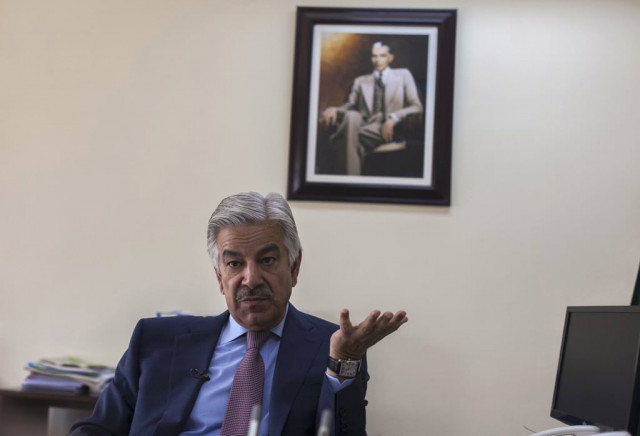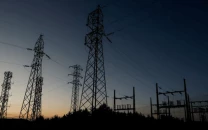Energy crisis: Power outages to last till 2017, says Khawaja Asif
PM Nawaz chairs meeting to end intra-cabinet spat

Khawaja Asif. PHOTO: REUTERS
The rolling, prolonged power outages that have plagued most of Pakistan since at least 2007 are likely to last until at least the summer of 2017, said Water and Power Minister Khawaja Muhammad Asif on Monday.
“It will take two to three years to overcome the power crisis in Pakistan, which is likely to end by the summer of 2017,” he told journalists at a news conference in Islamabad.
The new deadline given by the minister is at least a year longer than the amount of time the government had initially said it would take to end the power crisis when the Nawaz administration first took office in June 2013, when the minister gave effectively the same statement.
The press conference was being held in response to the nationwide blackout caused by tripping on the national grid caused by a Baloch separatist attack on transmission lines in Naseerabad district. Khawaja Asif said the damage to the grid would likely be fixed by Monday evening at which point power would be restored to most of the country.

Over the last two weeks, the government has faced a series of major embarrassments over its failure to implement a coherent energy policy, first with a shortage of petrol that crippled economic activity in most of Punjab and then the nationwide blackout that started Saturday night and appears likely to last longer than 48 hours.
The press conference followed a high-level meeting, chaired by Prime Minister Nawaz Sharif at the PM House in Islamabad. The prime minister was forced to personally take charge after his cabinet members publicly engaged in a politically damaging blame-game over the past week. Finance Minister Ishaq Dar in particular was very vocally critical of the ministries of water and power and petroleum, though he declined to name either of his cabinet colleagues holding the portfolios.
The meeting in Islamabad included both Dar and Asif, where the prime minister ordered the water and power minister to present him a report on the technical reasons for Saturday night’s blackout within 48 hours. He also asked for a system to be put in place to ensure that such blackouts are not repeated, and asked law enforcement agencies to ensure that the power transmission lines are secured from acts of sabotage.

At the press conference, Asif announced the new schedule of power outages, saying that industrial areas would be exempted from outages within the next two to three days, whereas the rest of the country would continue to face outages for several hours a day. “Eight hours of load-shedding will be carried out in the rural areas and six hours in urban areas,” he said. Actual power outages often greatly exceed government pronouncements on the matter.
While the water and power minister insisted – as his ministry has all week – that power plants across the country do not have a shortage of fuel, he admitted that his ministry owed Rs170 billion to the power companies, which in turn owe much of that money to the government-owned Pakistan State Oil (PSO), the largest oil company in the country that faces so severe a liquidity crunch that it is no longer able to import oil in adequate quantities. Yet despite having massive payables to the power companies, the minister also announced that the government would be reducing power tariffs, not increasing them.
Asif said the PSO would be receiving 12 cargoes of oil beginning Tuesday, though he did not specify how much oil those cargoes would have, and how much it was relative to expected demand.
The minister also said that the power supply situation would improve now that the hydroelectric power plants in the country – which were closed for a seasonal cleaning of canals – are expected to come back online, bringing in an extra 6,000 megawatts of supply onto the grid.
The minister also said that after the expiration of the agreement between the state-owned part of the national grid and K-Electric, the government would seek to ensure that Karachi suffers through just as much in power outages as the rest of the country, which he claimed was in accordance with orders from the Supreme Court.
Published in The Express Tribune, January 27th, 2015.



















COMMENTS
Comments are moderated and generally will be posted if they are on-topic and not abusive.
For more information, please see our Comments FAQ